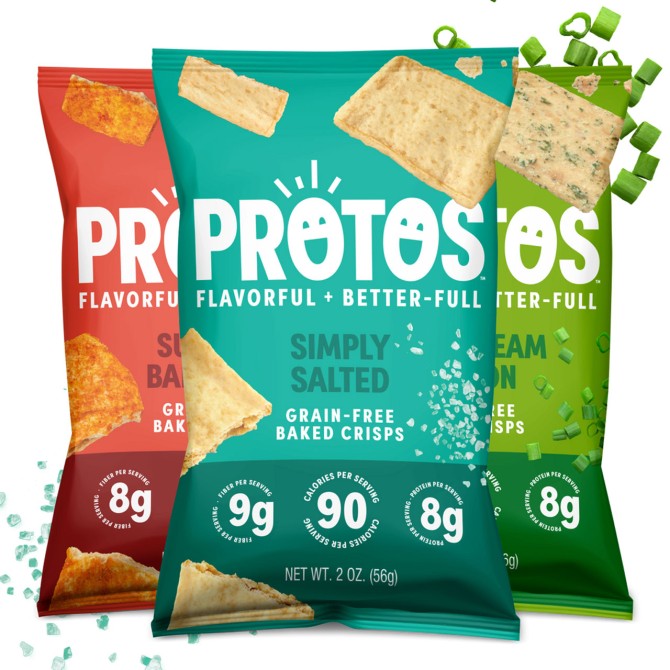
“Startup roundup” provides news and updates about Cornell-affiliated startups.
Startup Roundup: Antithesis Foods, Guard Medical, C2i, Bactana
By Blaine Friedlander
NSF awards $1M to Cornell snack startup Antithesis Foods
It began as a Cornell classroom project and has blossomed into student startup company. Now, the National Science Foundation has awarded a nearly $1 million small-business grant to Antithesis Foods for its novel invention to make healthy snack foods and crunchy ingredients from chickpeas and other legumes – all low-calorie, high-fiber and high-protein.
The funding advances a nutrient-dense, crunchy ingredient to get healthier snacks such as graham crackers, cereals, chips, granola and cookies on supermarket shelves.
Founded by Ashton Yoon, MPS ’17, M.S. ’19 and Jason Goodman, Ph.D. ’21, the funding allows Antithesis Foods – supported by Cornell’s Center for Regional Economic Advancement programs and mentors – to continue scaling its legume-based dough innovation.
The company is rooted in a Cornell food science class, “Concepts of Food Product Development,” then taught by Ali Abbaspourrad, the Youngkeun Joh Assistant Professor of Food Chemistry and Ingredient Technology in the College of Agriculture and Life Science, who assigned the students to form groups and create a product based on a current food trend.
This team developed a chocolate-covered treat – very similar to malt balls – from chickpeas, which later became Grabanzos, the company’s first product.
Once the recipe was improved, Antithesis Foods joined eLab, Cornell’s student business accelerator, to explore the market and create a business plan, and earned an NSF Small Business Innovation Research (SBIR) Phase I award.
During the Phase I project, Antithesis developed their technology into a legume ingredient platform. Their second consumer product, Protos, was developed from this research and launched in January 2022.
This recent $1 million NSF SBIR Phase II award, given in March, will help the company expand.
“As a startup, it’s difficult to take on too much risk, as you don’t get the luxury of failing too many times,” Yoon said. “This NSF award gives us the latitude to take on the high-risk process of expanding our production capacity to levels needed to get our healthier ingredients into the market in a big way.”
On the NSF Phase II grant, the Cornell food science faculty members advising Antithesis Foods are Olga Padilla-Zakour, professor of food processing, who now teaches the product development class; Syed Rizvi, professor of food engineering; and Abbaspourrad.
Guard Medical raises $11M in Series B investments
Guard Medical Inc. has raised a Series B investment of $11 million to support commercialization and clinical studies for its product NPseal, a negative pressure wound therapy dressing for closed incisions. The Series B completion was announced April 6.
NPseal is an easy-to-use and cost-effective negative pressure wound therapy surgical dressing with an integrated pump that establishes and maintains negative pressure with a few pinches. It was developed through the Minimally Invasive New Technologies (MINT) program, a collaboration between Weill Cornell Medicine and NewYork-Presbyterian Hospital in New York City.
The product is licensed through Cornell’s Center for Technology Licensing (CTL).
“The completion of the Series B demonstrates the confidence of the investors to support the next phase of our NPseal,” said Machiel van der Leest, chief executive officer of Guard Medical. “Securing additional funding will enable new clinical studies, increased commercialization and leveraging the NPseal technology into the high exuding and chronic wounds segments.”
In general, negative pressure wound therapy dressing has been shown to reduce surgical site infections, but other similar products have limited use due to high cost and complexity, van der Leest said.
NPseal delivers the same negative pressure wound dressing, he said, but in a simpler and less-expensive way.
C2i launches disease test in Europe
C2i Genomics, a cancer intelligence company using software licensed through CTL, launched its C2inform minimal residual disease test across Europe.
The C2inform test applies whole-genome sequencing and artificial intelligence to a 3 to 4 milliliter blood sample, which supports rapid and accurate detection of cancer, monitors disease progression and evaluates therapeutic efficacy, according to the company.
The test enables timely personalized treatment decisions and supports the creation of more effective cancer treatments through drug development partnerships. The test also reduces laboratory operation complexity, eliminates the need for a patient-specific assay and offers a rapid solution for cancer patients across the European Union, the company said.
“The last year has been incredibly exciting as we’ve solidified multiple global partnerships to expand our distributed diagnostic model,” said Asaf Zviran, CEO and co-founder of C2i Genomics, and a former lab member of Dr. Dan Landau, associate professor of medicine at Weill Cornell Medicine. “We’re eager to scale our C2inform test to bring whole genome cancer detection and monitoring across Europe.”
Bactana receives NSF business grant
The NSF has awarded Bactana Corp., a company that graduated from Cornell’s Kevin M. McGovern Family Center for Venture Development in the Life Sciences business incubator three years ago, a Small Business Innovation Research (SBIR) Phase I grant to expand research and development for a bacteria-derived therapeutic drug.
“We are grateful to the NSF for acknowledging our discoveries and granting this award, which will allow us to expedite our research and development efforts and support Bactana in its upcoming financing efforts,” said John Kallassy, MBA ‘03, Bactana’s chief executive officer.
“We anticipate our initial commercial success to address diabetes and other metabolic conditions in companion animals, where product development timelines and costs are much lower than those for new human products,” Kallassy said. “We also plan to expand into other markets through collaboration with human pharma upon completion of the 2022 objectives described in this grant.”
FPZ-100 is a patent-pending technology, licensed through the CCTL, made from peptides and metabolites derived from F. prausnitzii, a naturally occurring bacterium commonly present in human and animal gut microbiomes.
Bactana’s initial research focused on bacteria derived additives to improve feed efficiency and reduce antibiotic usage during livestock production. However, recent trials have shown that oral dosing of FPZ-100 significantly reduces diabetic and prediabetic blood markers in mice, without causing undesirable hypoglycemic side effects, according to the company.
Bactana joined the McGovern Center in 2017 and graduated from the center in 2019. The award was given in February 2022.
Once a small business is awarded a Phase I SBIR grant, it becomes eligible to apply for a Phase II – up to $1 million in additional funding.
Media Contact
Get Cornell news delivered right to your inbox.
Subscribe

